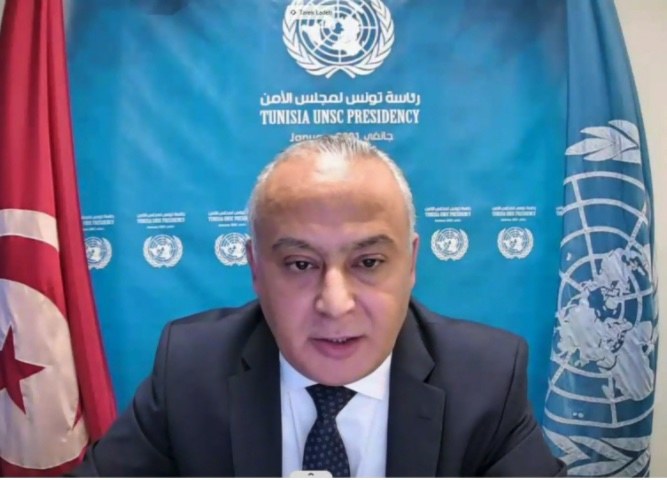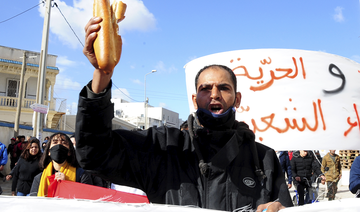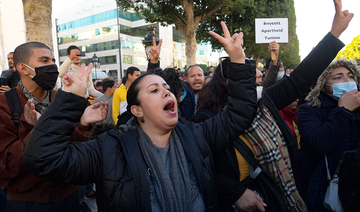NEW YORK: When Tarek Ladeb arrived in New York last year to take up his position as Tunisia’s permanent representative to the UN, he was looking forward to taking full advantage of all the opportunities the “fascinating city” has to offer.
A big fan of cycling, jogging and walking in the park, a museum lover and an admirer of cinema and the theater, Ladeb assumed that the Big Apple would have plenty of distractions to take his mind off any longing for Tunis when he inevitably felt homesick.
“I miss everything about Tunisia,” he said during an exclusive interview with Arab News. “My family, the people, the streets, our lifestyle — everything. I mostly miss that magical element that I cannot describe.”
Unfortunately, New York did not turn out to be quite the substitute he had hoped, as it was particularly badly hit by the coronavirus crisis, especially during the early stages last year. “The city that never sleeps” is unusually drowsy. With many of its greatest attractions closed for much of the past year the city remains, compared with its normal hustle and bustle, a ghost town: its famed theaters plunged into darkness, the shutters down at museums and art galleries, and innumerable concerts, exhibitions and book signings canceled or postponed.
“We hope that things get better soon so we get a chance to discover the city,” said Ladeb.
While New York city life has yet to return to its normal frenetic pace, activity at the headquarters of the UN in Manhattan has been anything but slow, especially for Ladeb. Tunisia held the rotating presidency of the Security Council this month, so his agenda has been packed. It included many of the key issues affecting the Middle East, including the wars in Syria, Libya and Yemen, and the Israeli-Palestinian conflict.
In his final speech to the security council in 2006, former UN Secretary-General Kofi Anan said that the issue of Israel and Palestine is “not just one regional conflict among many. No other conflict carries such a powerful symbolic and emotional charge, even for people very far away.” Fifteen years later, it remains a key issue.
“The Palestinian cause is a top priority in our foreign policy and our stint as the president of the Security Council,” said Ladeb.
He convened a ministerial-level meeting this month to discuss the Palestinian issue and, after many years of bitter divisions, the delegates united in calls for the revival of efforts to agree a two-state solution. They also joined together in urging the restoration of humanitarian assistance for Palestinian refugees, after US President Donald Trump pulled the plug on US financing for the UN Relief and Works Agency for Palestine Refugees in the Near East, which threatened the survival of the 70-year old agency.
“For a very long time, we hadn’t seen the security council united in one way or another over this issue,” said Ladeb.
“Now we are starting to see the light at the end of the tunnel as we felt a real common and joint engagement for a just and lasting peace; and most importantly, agreement on the terms of reference of that peace: the UN resolutions, the two-state vision, and the 1967 borders.”
This, along with a proposal to hold a ministerial meeting of the Middle East Quartet — the UN, the US, the EU and Russia — in the spring or summer, has reinforced Ladeb’s conviction that “we are on a new path of peace.”
Tunisia’s stint as president of the Security Council coincided with celebrations for the 10th anniversary of the North African nation’s “revolution of freedom and dignity.” It began on Dec. 17, 2010 when 26-year-old street vendor Mohammad Bouazizi set himself on fire in protest against the constant harassment he was subjected to at the hands of local officials.
Within a month, popular pressure toppled President Zine El-Abidine Ben Ali, who resigned in Jan. 14, and drove him into exile as the Arab Spring continued to bloom, from Beirut and Damascus to Cairo and Tripoli.
Although the 10th anniversary of the revolution was marred by continuing protests in Tunis against police brutality and unemployment, Tunisia remains the only real success story of the Arab Spring, with the only democracy to emerge from it. The ideals embodied by the revolution have informed the nation’s approach to international diplomacy in the past decade.
“The revolution has given Tunisia a new impetus and a new image that has strengthened our diplomacy, our action on the regional and international scenes in advocating principles of democracy, tolerance, cooperation and solidarity, and all the other universal values of the UN Charter,” said Ladeb.
“We feel confident when we represent our country and I am very proud to be Tunisia’s ambassador and defend the values of our foreign policy.
“We have no hidden agenda. We respect all our international engagements, the sovereignty and internal affairs of all the other countries, and we are always trying to be constructive — a positive, suggesting power, if I can describe it that way.”
By subscribing to those universal principles and international laws, Tunisia has been able to smoothly navigate the complex dimensions of its own identity “while taking into account our own interests, but without offending any party,” said Ladeb.
“The African, Arab, Muslim, Mediterranean: all of these dimensions are very important for our identity,” he added. “So all the issues on the Security Council agenda are a priority for us. But as we represent mainly the Arab region and the African continent, we are very sensitive to all the crises in these two regions, and we feel responsible for defending their views and pushing toward a settlement for their conflicts.”
If the Security Council seemed to agree on ways to move efforts to address the Palestinian-Israeli conflict forward, other virtual meetings descended into bickering as the permanent members, particularly the US and Russia, traded accusations and tried to settle scores. Washington demanded the end of the Assad regime, for example, while Russia defended it with rhetoric that placed all the blame for the Civil War and the resultant humanitarian disaster on the West.
However, the fifth round of talks of the Small Body of the Syrian Constitutional Committee this week has given Ladeb cause for optimism:
“Things can move if the two parties continue, in a constructive way, their talks about principles and foundations of the new constitution,” he said. “Because the constitution, if it can be adopted, can pave the way toward a political settlement of the crisis.
“But on the other hand, the humanitarian situation is still dire in Syria and Yemen. In the two countries, the situation is exacerbated by the economic difficulties. We hope that things get better and the suffering of these two brotherly populations comes to an end.”
Perhaps the biggest challenge facing the Security Council is its own waning credibility, and this, according to Ladeb, can only be rectified by “implementing its own decisions and resolutions.”
He said: “Whether it’s the resolutions related to the Palestinians or, for example, the arms embargo on Libya, if they are properly implemented, things can get better, especially in terms of security and ceasefire.”
As the Tunisian presidency of the Security Council comes to an end, Ladeb paused to consider the future.
“The most important message is faith and hope,” he said. “Many of our brothers in the Arab world and Africa have suffered for a long period.
“I think with hope, faith, patience — and of course cooperation and solidarity of all our countries and the international community and the UN system and the Security Council — these crises must have an end.
“Because we cannot keep silent as people suffer for decades, like our brothers the Palestinians. More than seven decades of suffering, of pressure. The international community, the Security Council, must assume its responsibility. Its moral, political and legal responsibility.”






















